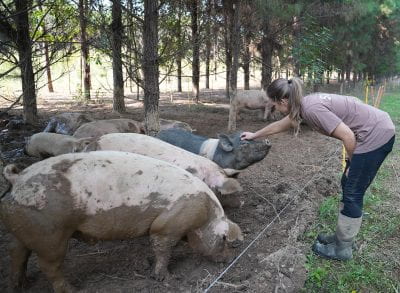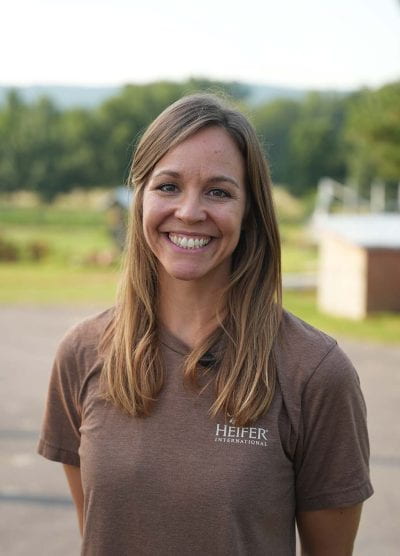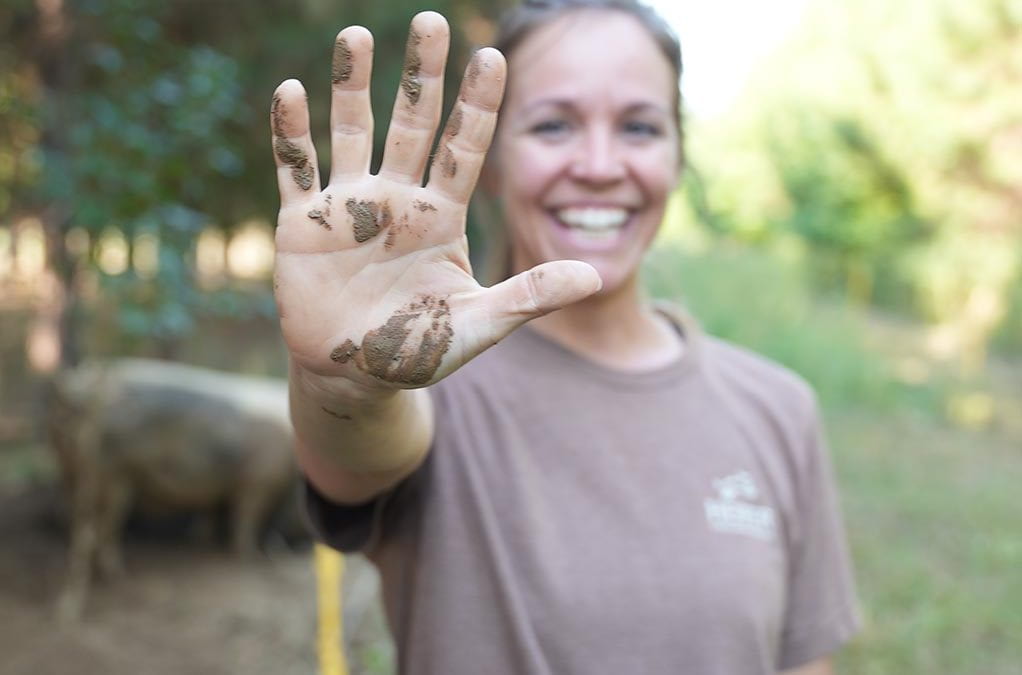Chelsea is originally from Northwest Arkansas and grew up on a family farm. So, why apply for a farm apprenticeship program? The motivation began with her love and respect for nature. She was bothered by some changes she saw on the farm. There was bare ground in the pasture from overgrazing. The garden soil had compacted from years of tractor use. Observing these prompted an interest in learning regenerative farming methods to restore and nurture the soil. She wanted to play a more active role in improving the farmland and surrounding environment. There was also a desire to increase food sources that support birds and pollinators.
After removing some invasive thorn trees and seeing results, Chelsea felt she developed a more symbiotic relationship with the land. Her continued inputs produced additional positive outputs, and the progress was undeniable. Her interest in learning more about regenerative farming took off.
 Regenerative agriculture is a farming method that allows nature to flourish by stewarding the land and continuing to restore it. Through researching learning opportunities, Chelsea discovered the apprenticeship program at the Center for Arkansas Farms and Food, which launched in 2019. She thought it would be a good way to learn faster than on her own. She also wanted to benefit from the program’s hands-on learning and direct mentoring of regenerative farmers. Along with qualified instructors, they could provide a supportive network in the future.
Regenerative agriculture is a farming method that allows nature to flourish by stewarding the land and continuing to restore it. Through researching learning opportunities, Chelsea discovered the apprenticeship program at the Center for Arkansas Farms and Food, which launched in 2019. She thought it would be a good way to learn faster than on her own. She also wanted to benefit from the program’s hands-on learning and direct mentoring of regenerative farmers. Along with qualified instructors, they could provide a supportive network in the future.
Before enrolling in the CAFF Farm Apprenticeship Program, Chelsea was a Clinical Laboratory Scientist, working for nearly a decade in a medical lab. She credits this scientific training with connecting her observations on the farm to realizing there was a better way for her to do things. Chelsea believes in supporting, investing, and enhancing our local ecosystems. “I think it’s important to give back to the land that so graciously continues to give to us,” she says.
Chelsea was placed at the Heifer Ranch Center for Regenerative Agriculture for her apprenticeship. It’s located on 1200 acres in Perryville, Arkansas. The working ranch is a research, education, training, and demonstration site for regenerative farming. It raises grass-fed cattle and sheep, pastured pork, chickens, and turkeys. Their regenerative farming practices include using no-till planting methods, holistic planned livestock grazing, and establishing cover crops.

The Heifer Ranch is part of Heifer International, a global development organization founded in 1944 with a mission to end hunger and poverty while caring for the earth. For 78 years, they have provided livestock and sustainable agricultural training to struggling communities worldwide. They currently work in 21 countries, including the United States, supporting local food producers to expand their businesses and earn a living income. Heifer USA, a Heifer International Area Program, trains, mentors, and invests in small-scale farmers in the U.S. They conduct research, development, training, and production. Heifer Ranch serves as a living laboratory educating farmers in regenerative agriculture practices.
Chelsea’s apprenticeship placement at Heifer Ranch provides daily opportunities to practice her convictions while she continues to learn. “During my time as an apprentice, I’ve realized that I’m just scratching the surface of information,” she says, “It’s been a wonderful opportunity to split my time between vegetable gardening and livestock, and I’ve been able to see both sides of agriculture.”
Chelsea has found the CAFF Farm Tours to be extremely beneficial. “The tours allow you to see various farm sizes, equipment, and layouts,” she says. “They are great opportunities to ask the farmers questions,” Chelsea notes that every farm she has toured is different depending on the land, soil, climate, production, employees, etc. Touring various farms with CAFF has provided a glimpse into the uniqueness of each and their different ways of doing things. CAFF’s other events provide a chance to network with other farmers. “You find a community of individuals passionate about farming and eager to help each other,” says Chelsea.
When asked what is most enjoyable about farm life, she says that growing up on a farm makes it the most comfortable setting. “I love being outside, working in nature, and being physically active.” She’s found it beneficial to connect with new people that are also passionate about regenerative agriculture and making a difference in the regional food system. There’s excited anticipation to see the improvements she can make at her family farm by putting into practice what’s been learned about regenerative land management. She expresses her continued commitment, “It’s important that we are all good land stewards for future generations.”
Chelsea’s future farming goals involve agriculture blended with habitat restoration and conservation. “I believe farmers are a big solution to mitigate climate threats by developing healthy soil, creating beneficial building blocks for ecosystems to thrive, supporting native species, and supplying nutrient-dense food,” She says. “I also believe everyone should have access to healthy food regardless of socioeconomic status, and I plan to contribute to my local food bank. I would love to participate in a system that puts locally grown food back into the community.”
Chelsea emphasizes the importance of gaining and enhancing her skills through hands-on experience. All of which are directly transferable to her future agriculture goals. When asked how her CAFF experience will affect her farm decisions in the future, she thoughtfully states, “My science background enhanced my ability to be a critical thinker and detail-oriented to notice minor changes. I would like to see either improvements or problems solved on our farm. I want to use what I’ve learned to blend habitat restoration of native species into our agriculture practices.” She believes the implementation will improve her farm’s resilience and increase biodiversity in the long term for future generations. “I am at a point where all my skills, experiences, hobbies, and interests are starting to collide. I am excited to see where it takes me.”
When asked what advice she would to herself, if she could go back in time, she says, “I would tell myself not to be afraid to ask questions, stay curious, and absorb as much knowledge and insight as possible. Keeping a good mindset is key to learning because rewards come through tough days and difficult situations.”
She also has advice for anyone interested in the CAFF Farm Apprenticeship program. “I’d tell them to follow their curiosity about agriculture and enroll. The CAFF program is a great way to connect with others in the field and ask questions. Get your hands dirty! That way, you can see if farm life is right for you.” For those who already have some agricultural experience, she recommends the CAFF program to help them start thinking seriously about a farm’s business side. The CAFF program includes classes that discuss financing, creating a business plan, and exploring markets. Chelsea recommends them, saying, “Each class and farm tour is well worth the time you invest. They are all very well-planned and thought out. The apprenticeship lets you see what farming is like regarding a daily routine, future planning, infrastructure, investments, and customer demands.”
It will be interesting to follow Chelsea’s farm as she implements everything she’s learned. It’s inspiring that a new generation of Arkansas farmers and ranchers is committed to responsible stewardship of “The Natural State” and seeing it thrive into the future.
If you are interested in a CAFF Farm Apprenticeship, learn more about the program or apply at LearnToFarm.org. The Center for Arkansas Farms and Food is part of the University of Arkansas System, Division of Agriculture.


Recent Comments